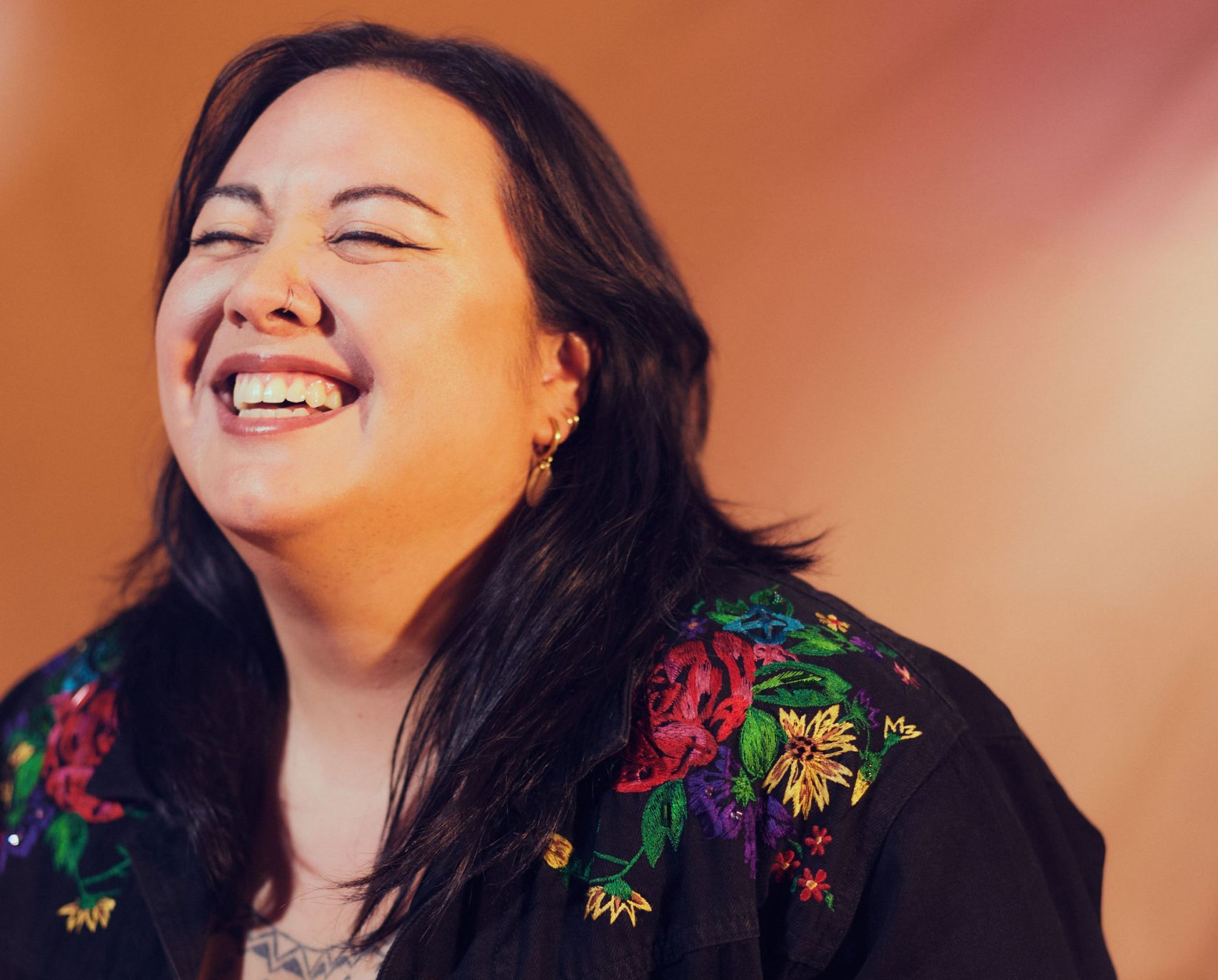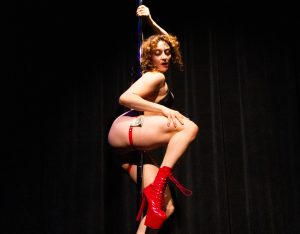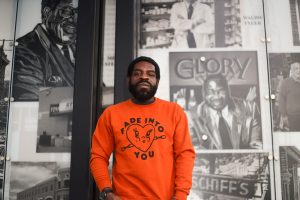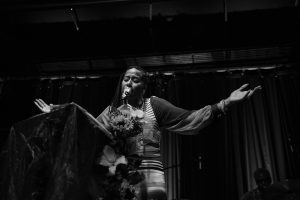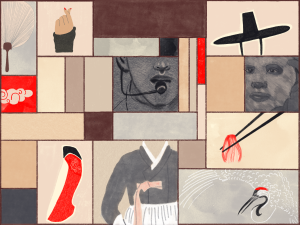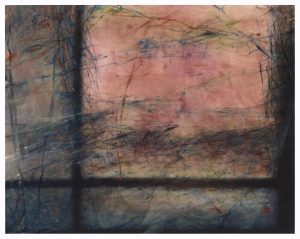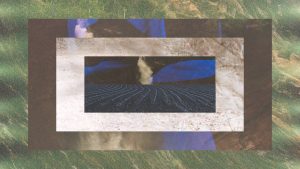The day Chris and I met for her photoshoot, she recounted a moment we shared in a Chicago poetry space months ago. I had just moved to the city and, by chance, I had come across a poetry organization, Luya Poetry, that was hosting an open mic near my apartment. Equipped with my wide-eyed wonder that only a move to the big city could inspire and a carefully selected poem of mine, I stared out the window of my Red Line train and let the main character energy sink in.
For me, this open mic was a big deal. For the first time, I was tentatively allowing myself to exist in rooms where I had previously felt both too much and not enough to be in. I attended this open mic alone and left it alone. I had no expectation of being seen. But Chris saw me and remembered. She remembered me reaching out to her on Twitter a few days prior with questions about the open mic. She remembered me showing up and taking a seat in the audience. She remembered me reading my work from the blue light of my phone. She took what could have been a moment so small and seemingly inconsequential and reminded me it was anything but. That’s the magic of Chris Aldana. She generously observes what many consider fleeting junctures and refuses to let them get lost in time. She grabs them with confident hands and takes her time understanding what is in front of her. She then finds a miraculous way to give it meaning. In her debut poetry book, “The Water We Swim In,” Chris skillfully does that on each page. She witnesses devastation in its various forms, sits with it, and does not turn away.
Chris Aldana holds many roles in Chicago including community organizer, arts educator, and founder of Luya Poetry. However, in this interview, we meet Chris Aldana—poet. She generously shares her experience writing and publishing her poetry book “The Water We Swim In,” while navigating the logistics of creating an unconventional, inventive book tour that aligns with who she is and what her community craves.
This interview was edited for length and clarity.
Shivani Kumar: When you wrote this book did you go into knowing what you wanted that end product to look like?
Chris Aldana: Writing this book was the first time I ever put a manuscript together. My publisher solicited me for the book. They were in the first couple years of operating so I was part of their first slate of authors. I had almost a decade’s worth of poems and thought, “How do I put this together?” I asked my friend, Hari Alluri, who is quoted in the book, what to do. He told me to put all my favorite shit in a document and see what happens. And so I did. I put what I thought were my strongest poems and created a manuscript while asking myself, “What do you like? What sticks? What feels like it should stay?” And when I had all of my work laid out like that, I was like, “Oh, there are themes in here. There are repeated images here. There’s repeated shit in here that I keep coming back to [over] years.” That guided me to what became the book. And it was helpful to me, mentally, to see all of my work like that and say, “Oh I’m a writer.”
SK: You are a writer!
CA: Right, but when I say I had debilitating imposter syndrome, I am not exaggerating. Writing this book has been a mental process to tell me that I’m good enough to do this. So when I put all the poems together, I chose the ones that felt like they should be together. I knew which poem I wanted to be the first poem, and it needs to end on this poem. So what is the order of the middle? That flow is what I spent a lot of time on with my editor. Once I had assembled what I thought were the final poems, I figured out the title. And when I had the title, I needed to add a few poems in here that [felt] very specific about water and the imagery because of the energy I was trying to build with the book.
SK: When you started writing poems, did you know you wanted to have a manuscript to publish a book? Was that the goal?
CA: Yes and no. Yes, in a sense, because did I think about it constantly? Of course. But it felt like this pie-in-the-sky idea—’yeah, I guess one day I’ll have a book. Someday something will happen, and I’ll have a book.’ It’s funny that it happened the way that it did because when I signed the contract for the book I remembered that, when I was in my early 20s, I had done this exercise at my old workplace to list [my] goals. One of them was to publish a book by the time I was 30. At the time, I had thought it was going to be a young adult fantasy novel, not a book of poetry. But it makes sense that it ended up being that because that’s what I’ve been devoting all this time to for the past 10 ten or so years of my life.
SK: As someone who is a community organizer, educator, and works a nine-to-five—how did you create a sustainable writing practice that allowed you to bring this book together?
CA: I honestly don’t know if I have created the sustainable writing practice that I want. As someone who has always had a job since I was seventeen, the idea of having an extended time to write and a writing practice has always felt luxurious to me. Not that it’s a luxury to have it. If your job is to be a writer, then you absolutely need a process. But for me and many other working artists, you write when you can. A lot of the poems I wrote the first draft or the first few lines of it in transit on the Red Line or waiting for the Brown Line! So much of my poetry is me writing on a bus, or on a train. And then the editing is happening later at like 11 pm.
Some people think I’m socializing a lot. And I am. It’s true. But, a lot of the time, it’s related in some way to Luya or my own practice as a writer. I want to go to the poetry show, but I also want to make sure I meet and talk to other poets [who] are there. My lifework is my writing. So, I have my nine-to-five. And my five-to-nine is going to art events, reading, and writing. To answer your question, I write whenever the fuck I can. I write a lot on my phone’s Notes app. My editing process is something I focused on for this book. I did a lot of re-writing. My publisher has a round of edits, sent it to beta readers, [and] got it blurbed. And for myself, I had a working draft of the manuscript. But for every poem, I keep track of every draft. That was a tip I got from a friend of mine who did Shira Erlichman’s poetry workshop, Insurreal Life.
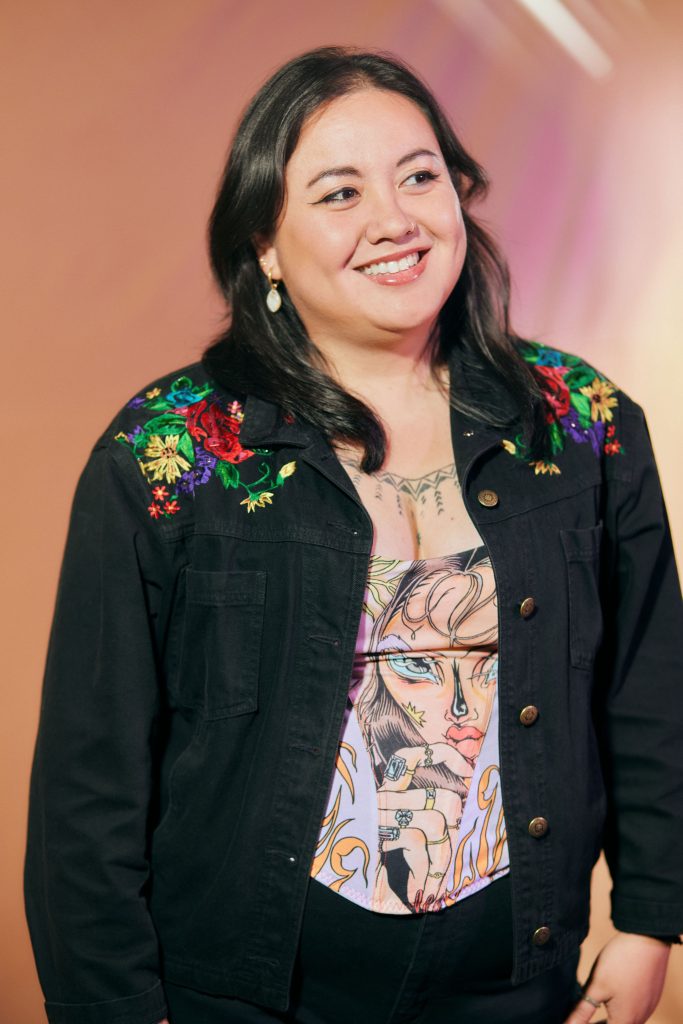
SK: I appreciate what you said about writing in movement. A lot of my poems are ideas I have on a walk or in transit. I often need quiet space to edit. But the writing? The writing never stops. And I think that’s a misconception of a writer—that you only write when you’re stationary at a desk or your couch. I think the writing happens when I’m with my body the most.
CA: Yes! In the past few years, I’ve been trying to learn more about my own neurodivergence and to stop fighting my own brain. The writing can happen wherever happens. Most of the time it’ll probably be in my Notes app. Sometimes it’ll be in my notebook. I’m not one of those people with a specific poem notebook because it didn’t work for me. I’d forget it somewhere. Or be somewhere I really need it, and it was at home. For me, it just has to be digitally uploaded as soon as I can.
SK: How do you maintain a regenerative writing process especially when writing about heavy themes like colonization?
CA: It’s having deep, generative relationships. I can write about the things I write about and not become retraumatized because my support system for my writing is the support system for my life—which is my chosen family, my friendships, and my friendships [with] other artists. I feel very lucky to have made friendships with a lot of people who write. But even before that, my friends have always been people who are always creating something. When I started Luya, hardly any of the people who helped me were poets. But they were still artists who appreciated other art. Even if I don’t need feedback, having people who are always down to read a poem line is nice because someone has seen it. Having those people who like to talk about art so we can talk about ideas together. Writing doesn’t feel like a solitary activity to me. It never has. I have a hard time relating to other writers who say writing is a solitary practice. The actual writing may be done on my own. But everything leading up to it that informs it, is never alone.
SK: It’s beautiful that your process is tied to community and only possible with community. For newer writers, one of the biggest pieces of advice they get is “You need a writing community”. I think it’s often positioned in a way that’s, “You need a community to progress”. But I think you need a community to stay where you are and not leave a place.
CA: You need people around you [who] are just as excited and nerdy about the thing you were spending all of your brain space thinking about. Otherwise, you’ll be lonely. Maybe some people are into that, and it helps them. Genre-wise, poetry lends itself to community because poems are shorter and lend themselves to performance. You go to an open mic and poetry can be more accepted versus a chapter of your novella. Certainly, some people try. Props to them! So, I do recognize that my art form does lend itself to that. But also, my life and how I move lends itself to that. I write alone, but I never feel lonely in my writing.
SK: That was an extrapolation of a Jamila Woods lyric.
CA: I quote her in my book. She’s in my top five artists of all time. I love the way you can so clearly tell in her work that she is writing for Black people. It makes me want to make work that directly addresses my community, too. That’s something I love about what she does. I know who this work is for, and anyone can enjoy it and step into this space, but also, I know who I’m talking to. I really try to do that in my work.
SK: You did a book tour this summer. Can you talk about how you navigated the logistics and finances of this huge endeavor?
CA: How did I navigate it? [laughs] Jumping into doing this book continues to bring up so many internal tensions because I did this really big thing—I wrote a book. It’s been difficult for me to sit with that achievement. After teaching poetry and hosting a poetry space for so long, I have stepped into art spaces as me but also as Luya. Both are always happening at once. But to have a book out, no this is just about me. Yes, it is tied to, carried by, and couldn’t have been possible without so many different people, groups, spaces, and communities. But it is still my book. That’s been a lot to grapple with, like worrying how people perceive me. Once I actually did raise all the money to go on this tour, that’s when I was like, “Oh, now I have to go on tour!” I thought we would raise enough money to go to one or two cities, but we reached the stretch goal. I remember I didn’t know how to do this thing. My press didn’t know how to do this thing, either, but I have the audacity to figure it out.
The kind of tour that I did was one where I wanted to figure out ways to make each tour event feel like a community event centered around poetry as opposed to a poetry reading at a bookstore. The day my book officially came out, I was in LA. We partnered with an organization called Sunday Jump that’s been running spoken word/slam event for years. They run it out of the Filipino Workers’ Center which is a community organization that works with working class Filipinos and undocumented Filipinos. I don’t know who would show up to my event or if I have enough of a reach, but whatever! I knew by choosing to do it this way, I would build relationships. I would get to talk to people to see what organizations you are working with in your city. I want to tell them what we do in Chicago, what Luya is like, learn from one another. Both events I did in New York were great for that. The second event there was at the People’s Forum where a bunch of community organizations and a mutual aid group tabled. Artists who were hustling on the side to sell prints and jewelry tabled and talked about what they do. Seeing these people who came for the show and poetry in this one place head over to the tables during breaks—this is what I wanted. I wanted to use the fact that I have this book to make it into a ripple effect beyond the book.
In Chicago, I read at Women & Children First, but I wanted to do something special for the people here that they wouldn’t see otherwise. I wanted to fundraise for the Rizal Center. I thought about who I wanted to perform with me. I knew the people who came to see me would really fuck with the other artists I invited. So I asked Rich [Robbins] and Neil (DJ Napp) to perform because I knew the people would appreciate Rich’s lyrics and hear the poetry in them. I wanted KT to be there because she sings like a fucking angel. Also, there are people in that audience who are musicians themselves, and they appreciate how hard it is to do this. And for Nash to do their comedy, because I want Nash to be in front of an audience where every single fucking person gets their jokes, you know? It felt beautiful to see them be comfortable with themselves and shine on stage. I could see the audience loving what they were doing.
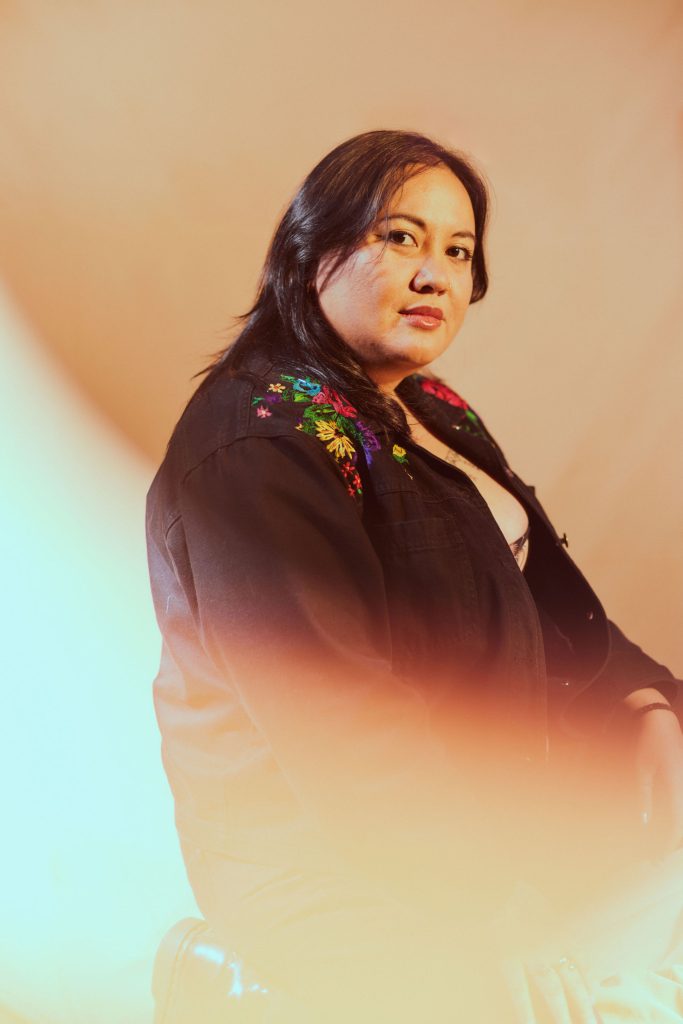
SK: Again, with community being such a vital part of your work, there were so many parts of the night in Chicago where pieces of other communities were celebrating alongside your Filipino community. That was so special.
CA: That was what was exciting to me about the book tour. If I’m going to ask people for money to help me out with this thing, I want to be on ten everywhere I go. I didn’t know what was possible for art and community, both politically and artistically until I saw it somewhere else. That’s what people feel about Luya. They didn’t know that you could be just a bunch of queer, brown people doing art like this and talking unapologetically about your shit. I wanted my book tour to feel like that.
The reason I was able to pull this tour off without an agent, promotor, or manager is because of everything I’ve learned, even from my college Filipino student association where we are always creating dope stuff on a shoestring. It’s been so moving and humbling to see how other people want to be part of this thing. It feels grounding to be able to reach out to down-ass, capable, hustling, creative artists in other cities and says, “Hey, this is what I want to do. This is the vision.” And they are like, “Bet.” And if any of those people came to Chicago, I’d be like, “What do we need? What’s our budget? Zero? Fuck it. Let’s do it anyway!”
SK: When I read your book, there were so many poems about the colonization of Filipino people. Truly, every single day of my life, I struggle with the aftereffects of the colonization of my people in India which is still happening in overt and quiet ways. As a writer, I find that place sometimes difficult to access because the grief is so overwhelming. It is in my lineage. I feel it in my body. I see it when I see my parents. Can you speak about how you were able to approach writing about colonization safely?
CA: There are a few layers to this. First, how do I write about culture and identity? People have asked me when I started writing poems. But I feel asking me when I found my voice is a much better question. It was at some point in college when I was getting into spoken word and slam. I was deep in the Button Poetry YouTube hole [laughs].I felt like I was doing a lot of mimicking others’ style. My poems didn’t feel fully me until I decided to just write about Filipino shit. If people like it, great. If they don’t, whatever. The people who are supposed to receive it, will. I gave myself permission to do that. That’s when my poetry took off. I had so much to write about. I just needed to give myself permission to start writing.
The thing that happened in a non-writing space that helped my writing was becoming more politically involved. Being a community organizer meant that I had to spend a lot of time thinking about what my stake was and why I wanted to do this specific work in terms of the identities I hold. My family is a family that has been touched by war. We don’t really talk about it explicitly, but when my Lolo was alive and making jokes about him and his sibling [living] in a cave—like, they lived in a cave because there was Japanese occupation in his town during World War II so they couldn’t live in their houses. My Lolo’s sister would say it was traumatic for her to hear planes because as a kid, she was hearing war planes. The work that I’m doing in organizing to make this city and world better is within my lineage. There is an idea of artist as witness. I can write about this stuff now because I moved away from thinking of myself as someone who is bearing witness to all this to. I am in this. My family is the way it is because of all of these big systems. My life is the way that it is because of intersections of oppression. And your life is the same, too.
Step one was figuring out who I was writing for. I had to allow myself to write about Filipino things and know I’m not writing for white people. Then, I had to figure out why is it important for me specifically to write about this. That came from organizing spaces. The third thing was being less precious about my writing overall. If I write this poem about this really tough thing, then that’s fine. I might need to write this to work through something, and that’s ok. And it doesn’t have to be the best poem. It can just be a poem.
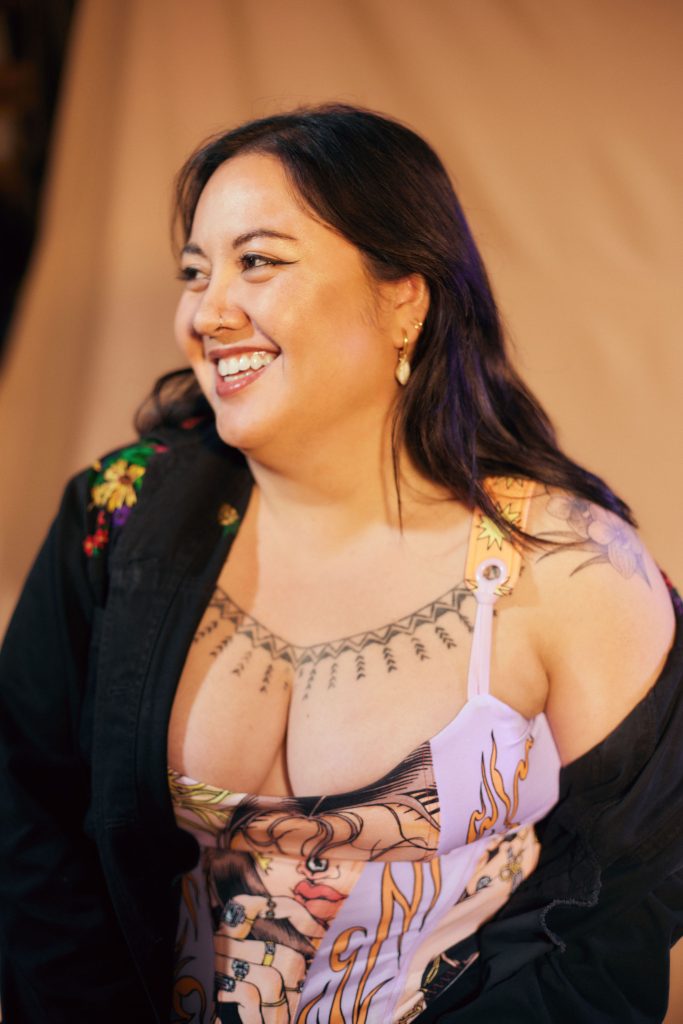
SK: Your book is an ode to radical care for a very deeply broken world we are in. What are some of the ways you take care of yourself while writing about heavy topics?
CA: Weirdly, the poems I’ve needed to pause after writing are not the poems where I am raging about the government or Filipino history or international oppression. I have had many outlets to unpack and process those particular things because so many of my friends are radical organizers. I have learned from them so much of my politic. The things that have been actually difficult [for me] are poems about interpersonal relationships, violence, loneliness, gender, or roles. If I write a poem about a relationship that failed, I can’t work out my feelings at the protest about that. My self-care practice is something I’m still building, but I am trying to take breaks. It feels so silly and simple. It just consists of allowing myself to leave something unfinished for a second and allowing myself to do something that isn’t writing. I am going to go to that show. I am going to shake ass at that dance party. I am going to hang out with my friend in my pajamas all day and not even think about poems. My self-care looks like living my life. My poetry comes from living a full life. Poetry will always be there. I do not see a future in my life where there is not art and poetry, so it’s fine if I go do something else for a minute. It’s fine if I put this poem down.
SK: I’m going to remember that the next time I’m down on myself for taking a writing break. Last question: do you have any words of wisdom for poets and writers who want to pursue their writing dreams in a world where their craft is not always valued?
CA: One, find a political home. For me, it helped me immensely in dealing with the ills of the world somewhere that is not just your writing. It could be a political organization or community group you do something with. But it needs to be with people so you’re grounded in what is the real world and what’s going on with your people. Two, if you are waiting for someone to give you permission to write the poem or book or start the project, stop. I’m giving you permission [laughs]. I spent a lot of time waiting for someone else to tell me I’m good enough. It is the thing that has held me back my whole life, even now, the most. It holds me back when I’m applying to things, writing things I want to write, and trying new stuff. Sit with the fact that no one is going to give you permission to be you except yourself. Even if that means faking it till you make it, that’s ok. Eventually, the rest of you will catch up to it. And the last part of it is, find something creative and artistic that you like to do that isn’t writing. Something that you don’t feel like you must monetize. Something that just makes you happy to do. Anything can be creative, too—like rock climbing, gardening, or farming. With all that, I think you’ll find yourself more willing to play and experiment. It’ll make you a better poet.
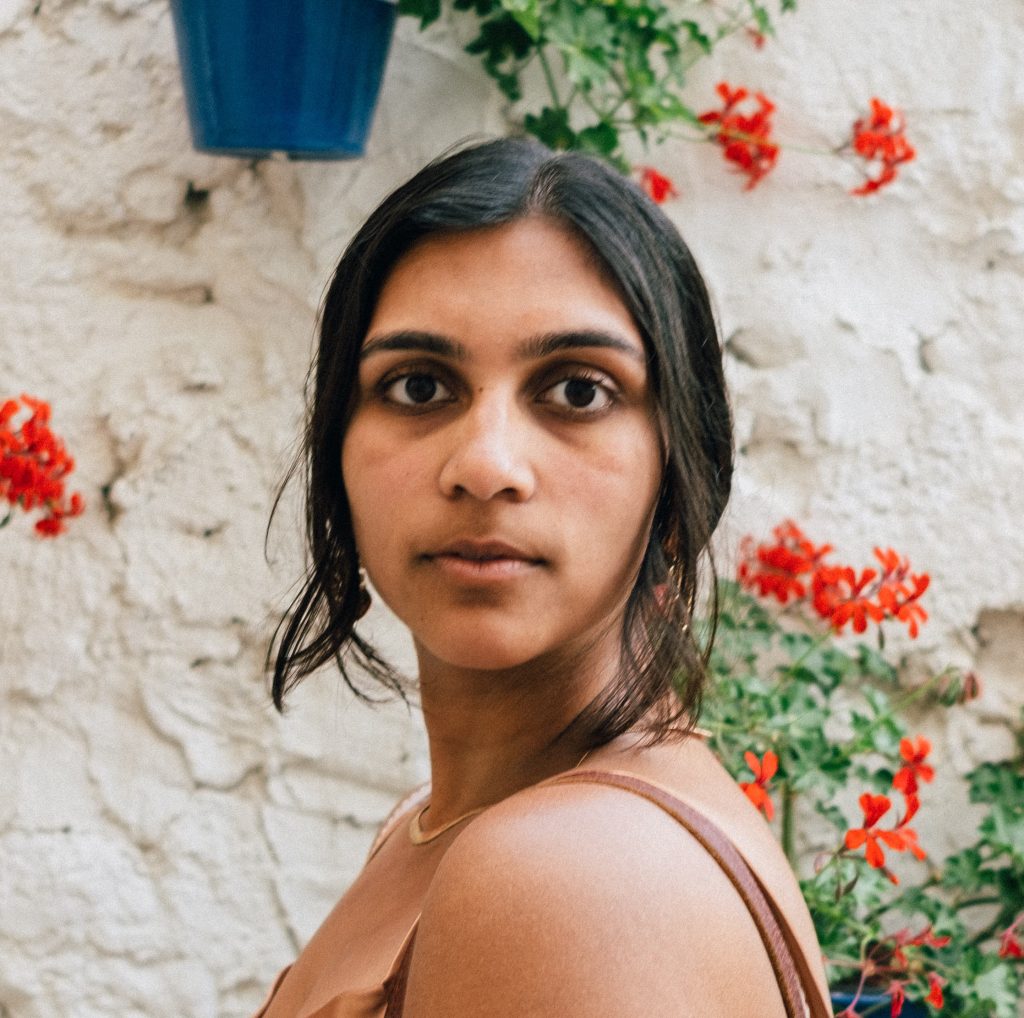
About the author: Shivani Kumar is a writer from Worcester, Massachusetts. Her work is guided by her passion of connection to destinations, opportunities, and self. She is currently working on her first poetry book that holds themes of community, belonging, grief, and identity as a Tamil-American woman. Her work can be found in Vagabond City Lit, Sixty Inches from Center, Sarka Publishing, Kajal Magazine, and forthcoming in the Chicago Reader. She resides in Chicago, Illinois where you can find her yearning by the lake.
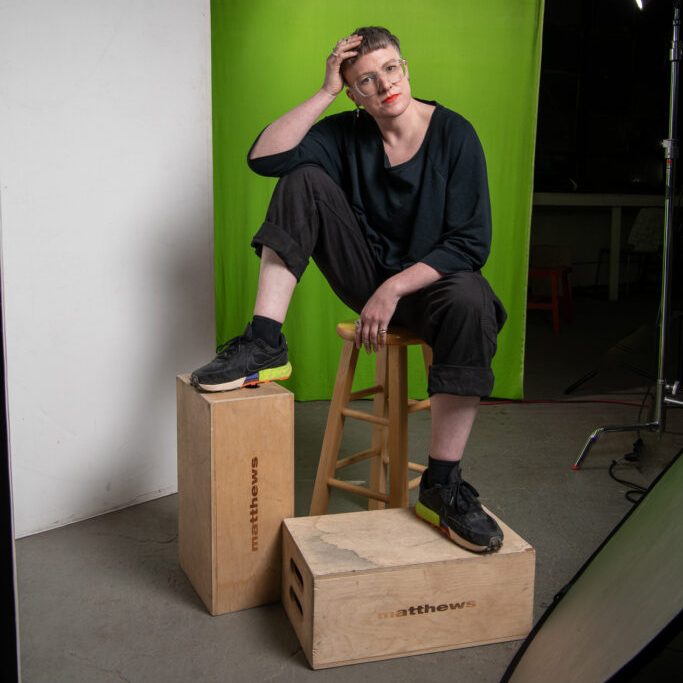
About the photographer: Sarah Joyce is a photographer based in Chicago. In addition to portraiture, she’s been documenting the cultures, subcultures, and countercultures of Chicago for the last 10 years as a co-founder of GlitterGuts. Photo by Mariah Karson.
